 New Horizons
New Horizons
 Project Management Academy
Project Management Academy
 Six Sigma Online
Six Sigma Online
 TCM Security
TCM Security
 TRACOM
TRACOM
 Velopi
Velopi
 Watermark Learning
Watermark Learning
 New Horizons
New Horizons
 Project Management Academy
Project Management Academy
 Six Sigma Online
Six Sigma Online
 TCM Security
TCM Security
 TRACOM
TRACOM
 Velopi
Velopi
 Watermark Learning
Watermark Learning
The Adaptive Mindset for Resilience® program is based on decades of research in clinical psychology and teaches strategies that are proven to help people become more adaptable to change and resilient to workplace stressors. Get started now!
TRACOM spent over a decade researching, developing, and refining the Adaptive Mindset for Resilience program. Central to the program is a Negativity Bias Profile, which measures the automatic negative thoughts a person experiences in response to stressful events. See how our training addresses common workplace problems.
Resiliency employee engagement training enhances engagement by showing people how to recognize and overcome their negativity bias. People learn a process of challenging their automatic negative thoughts and then finding more productive ways to think and behave during difficult times. Instead of feeling paralyzed, people learn strategies to adapt and interpret events more realistically, which leads to empowerment and control over their thoughts and actions.
Your employees will be more engaged and productive.
Resilience is an essential part of a healthy and thriving team – it’s especially important for individuals and teams in high-stress or dynamic environments that are experiencing disruptive change.
Learn More
A primary role of leaders requires tackling the burdens of bridging conflicting interests of employees and the corporation. And now, given rapid technology advancements, the business world we operate in is continuously evolving, leading to high frequencies of change, newly emerging competitors and increasing needs for adaptive technical skills. This responsibility is resting on the shoulders of leaders to resolve; the stress of management today is more daunting than ever before.
Resilient leaders are those who adapt to changing circumstances and environments with ease, viewing new challenges as opportunities rather than hardships.
Leaders with Resilience training are:

Resiliency training helps salespeople overcome the natural, negative biases that affect us all. They learn to effectively deal with challenges of selling and coping with a fast-changing environment.
People with resilience skills were found to be:

Your sales team will generate better results and higher customer satisfaction with resilience and adaptability training.
Learn MoreWhile change may be necessary it is also disruptive, and large-scale change efforts are often downright overwhelming to the employees who are tasked with implementing them. Most people simply don’t respond well to change.
TRACOM’s Adaptive Mindset for Resilience teaches powerful skills to address our fear of change.
Each learner learns about their primary Negativity Bias and specific skills they can apply to change their response to adversity. Plus with the Resilience Navigator online resource, they have ongoing access to job aids and advice on dozens of workplace topics. You’ll see an improvement in productivity immediately.
Learn MoreEmployee wellness is evolving as organizations seek to provide better support to employees in a world of change and stress. Today most organizations – and almost all large employers – offer a “wellness program” of some sort. But research shows that most employees don’t even sign up, with participation estimates range from only 20 to 40 percent.
One of the primary reasons for such low usage, and lack of success, is that most programs focus solely on physiological wellbeing aspects such as smoking cessation, weight management, etc. And while physical wellbeing is certainly important, a more holistic approach to employee wellbeing is starting to be researched and understood, incorporating elements such as employee purpose (like what you do each day), social wellbeing (have supportive relationships), and physiological resiliency. These newer models account for the stressors within the workplace that are affecting people’s overall wellbeing, as well as the psychological and behavioral factors that impact people’s ability to maintain their own health. TRACOM programs have a proven impact on supporting mental health in the workplace.
A comparison between adults involved in physical wellness programs versus those involved in wellbeing (physical and emotional) programs, studies found those in holistic workplace wellbeing programs do better:

Find more information about the Model, the Assessment, the various training programs and how to teach Resilience at your organization.
There are six Negativity Bias patterns, but you can pull yourself out of the Negativity Trap by recognizing your negative thoughts as they occur.
The Adaptive Mindset for Resilience Assessment and Profile measures a person’s Negativity Bias, which is the way a person typically reacts to stress.
Learn how to teach and implement Resilience like the best-of-the-best teachers and facilitators all over the globe. TRACOM’s comprehensive approach ensures you are fully prepared to deliver the program.
TRACOM has developed Resilience training programs that vary in length and depth. Our programs are available as in-person, virtual, and eLearning formats.
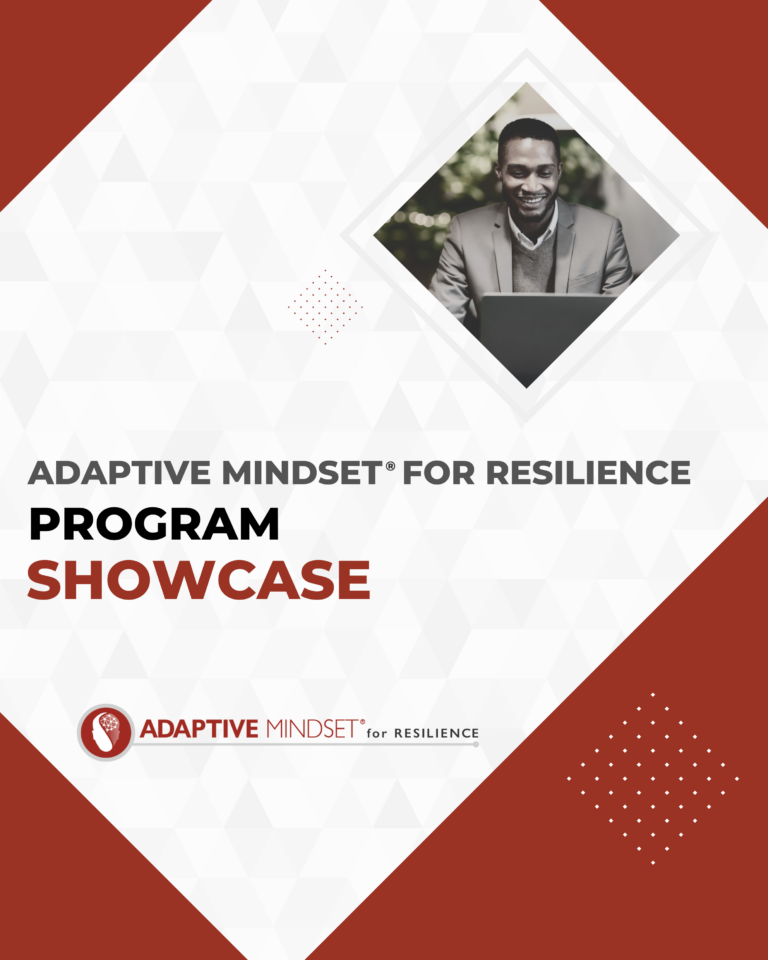
We provide Learning & Development Leaders, Facilitators and Consultants a first-hand look at our models and assessments. Register for a Program Showcase and see how our Resilience training can add value to your organization.
Each one-hour session is delivered online with a certified facilitator. It includes a follow-up phone/video session where you’ll receive your individual profile report and discuss how social intelligence skills can be developed within your organization.
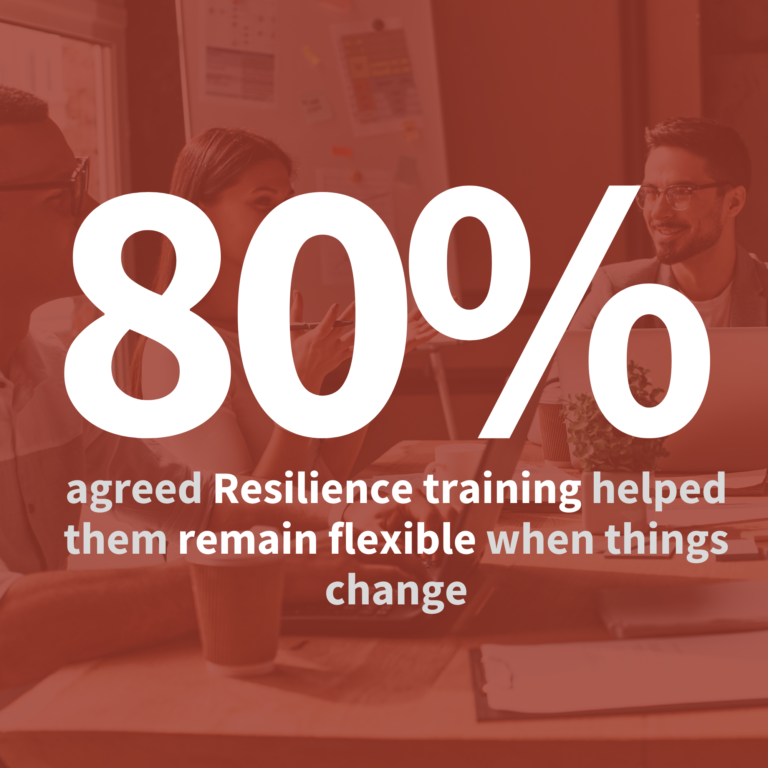
Research showed that 80% of Resilience training participants agreed the training helped them remain flexible when things change.
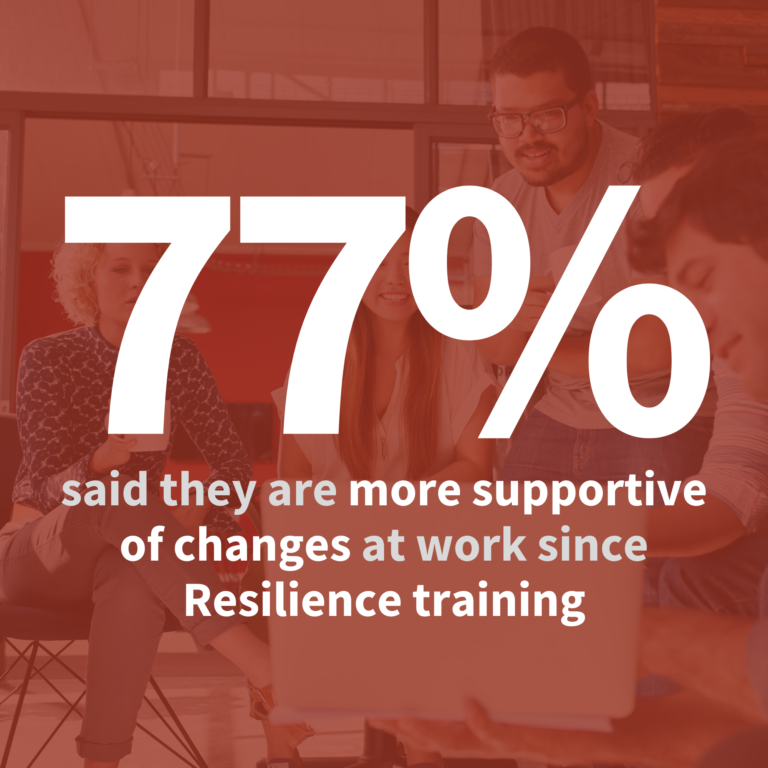
Research showed that 77% of Resilience training participants said they are more supportive of changes at work since the training.
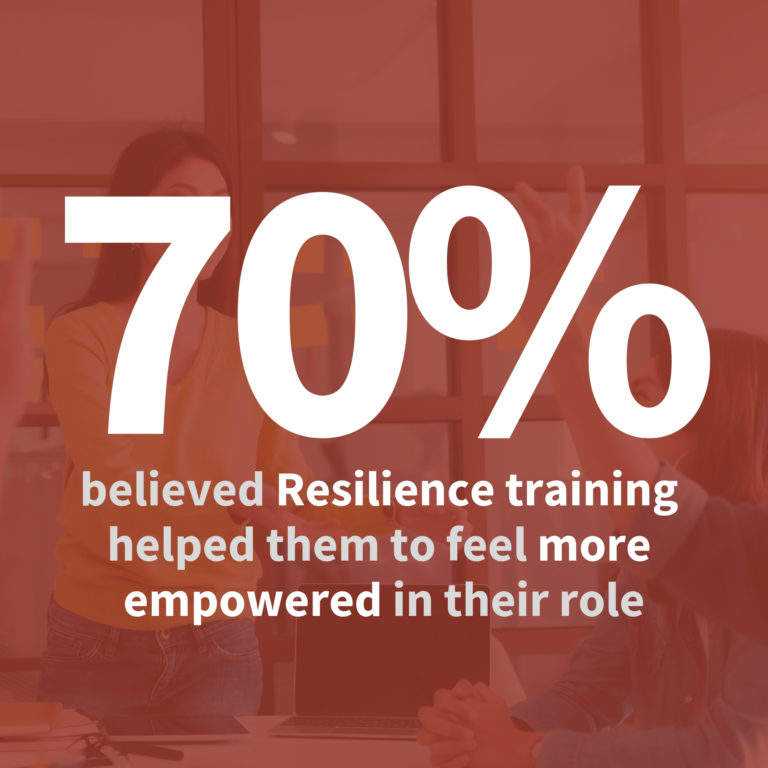
Research showed that 70% of Resilience training participants believed the training helped them to feel more empowered in their role.
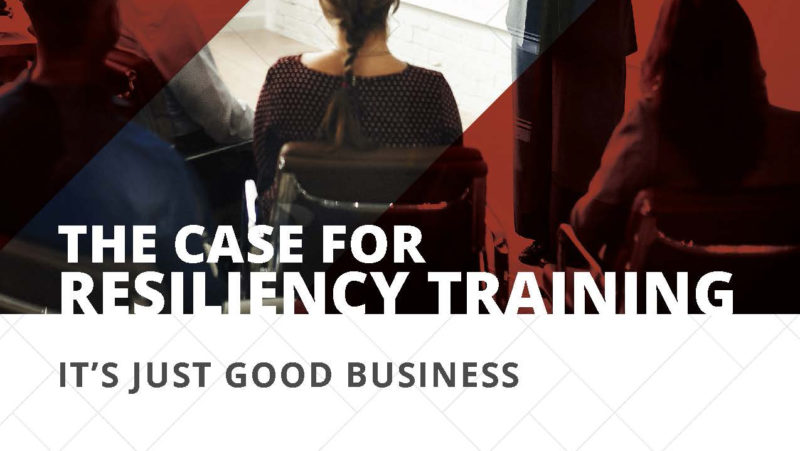
Organizations — and especially senior HR leaders are looking for ways to help employees deal with the effects of workplace change, strain and anxiety. Whether they know it by name, they are seeking individual and organizational Resilience. This whitepaper looks at five areas where Resilience skills have an impact on individual and organizational performance, referencing research from TRACOM® and other studies
Fill out the form below to get more information on helping your team be more adaptive when things change.
Resilience training is not just an investment in a business; it’s an investment in its most invaluable asset – its employees.
Resilience training in the workplace zeroes in on crucial skills to help employees adapt to and navigate change and implement changes in a way that benefits all involved. These include recognizing and managing emotions, bolstering self-esteem, setting and attaining realistic goals, and comprehending the scope of one’s influence in a situation, as well as acknowledging the boundaries of control. A resilient team can better build engagement amongst themselves, navigate and facilitate change into a force for good, and provide mental clarity to those impacted. Change isn’t something to be fear… a resilient team can turn change into a force for good.
Sign up for Tracom’s Resilience Training and embark on a journey towards a more empowered, adaptable, and thriving workforce.